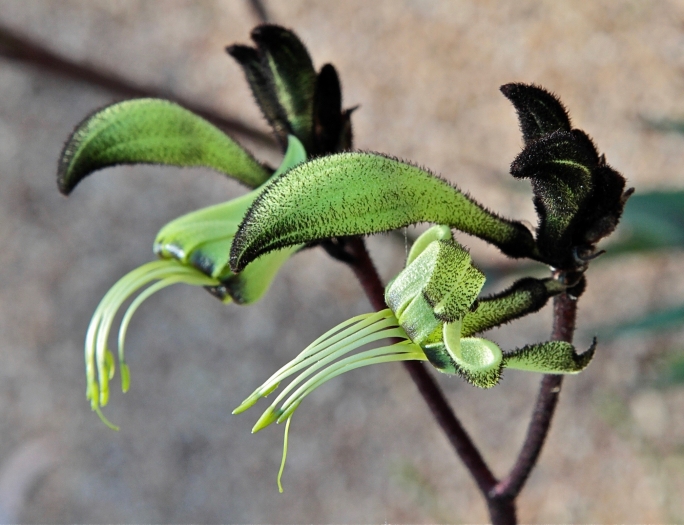Black Kangaroo-Paw
(Macropidia fuliginosa)
Black Kangaroo-Paw (Macropidia fuliginosa)
/
/

Alexey Yakovlev
CC BY-SA 4.0
Image By:
Alexey Yakovlev
Recorded By:
Copyright:
CC BY-SA 4.0
Copyright Notice:
Photo by: Alexey Yakovlev | License Type: CC BY-SA 4.0 | License URL: https://creativecommons.org/licenses/by-sa/4.0 | Uploader: Alexey Yakovlev | Publisher: Wikimedia Commons | Title: Macropidia_fuliginosa_flowers.jpg | Notes: User created page with UploadWizard |






























Estimated Native Range
Summary
Macropidia fuliginosa, commonly known as Black Kangaroo-Paw, is an evergreen perennial herb native to the sandplains and coastal heathlands of Western Australia. It typically grows to a height of 1-2 feet (0.3-0.6 meters) with a similar spread. The plant is characterized by its unique, bird-attracting flowers which are a striking combination of black and green hues, making it a distinctive addition to gardens. The flowering season extends from spring to summer, with the blooms being particularly showy due to their contrasting colors and unusual form.
Black Kangaroo-Paw is valued for its unique flower coloration and architectural form, which adds an exotic touch to garden displays. It is often used in ornamental gardens, as a feature plant in borders, and in native plant landscapes. This species requires well-drained sandy soils, consistent with its native habitat, and thrives in full sun to part shade. While it is drought-tolerant once established, it benefits from regular watering during extended dry periods. It is relatively low-maintenance but can be susceptible to ink disease, which causes blackening of the leaves. Propagation is typically done by division of the rhizomes rather than from seed, as seed germination can be challenging.CC BY-SA 4.0
Black Kangaroo-Paw is valued for its unique flower coloration and architectural form, which adds an exotic touch to garden displays. It is often used in ornamental gardens, as a feature plant in borders, and in native plant landscapes. This species requires well-drained sandy soils, consistent with its native habitat, and thrives in full sun to part shade. While it is drought-tolerant once established, it benefits from regular watering during extended dry periods. It is relatively low-maintenance but can be susceptible to ink disease, which causes blackening of the leaves. Propagation is typically done by division of the rhizomes rather than from seed, as seed germination can be challenging.CC BY-SA 4.0
Plant Description
- Plant Type: Herb
- Height: 1-2 feet
- Width: 2-3 feet
- Growth Rate: Moderate
- Flower Color: Green, Black
- Flowering Season: Spring
- Leaf Retention: Evergreen
Growth Requirements
- Sun: Full Sun, Part Shade
- Water: Medium
- Drainage: Fast
Common Uses
Bird Garden, Butterfly Garden, Low Maintenance, Potted Plant, Rock Garden
Natural Habitat
Native to the sandplains and coastal heathlands of Western Australia
Other Names
Common Names:
Scientific Names: , Macropidia fuliginosa, Anigozanthos fuliginosus, Macropidia fumosa, Anigozanthus fuliginosa,
GBIF Accepted Name: Macropidia fuliginosa (Hook.) Druce